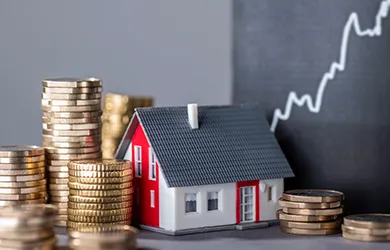- Our Story
- Our Impact
-
Our Projects
Residential
Commercial
- Careers
Unlocking the Secrets: 7 Factors that Drive Property Value Appreciation
By LODHA
October 11, 2023Over the last decade, India's real estate market has displayed remarkable resilience, weathering economic storms and emerging stronger. Data reveals that property values have been on a steady ascent, far outpacing inflation rates and exemplifying financial growth. These trends have underscored the importance of comprehending what fuels this upward trajectory, as it can determine the returns on investments and the allure of homeownership.
For homeowners or those contemplating buying or selling a house, the question of what leads to an increase in the market value of property may arise. This increase in value is referred to as appreciation. Appreciation results from a blend of interrelated factors that converge to boost values and ascertain the potential profit from a sale. Grasping the intricacies that contribute to this appreciation is vital for both current homeowners and prospective buyers.
Let's have a look at what can increase the flat rates in Mumbai and elsewhere:
Advancing Infrastructure
Urban development hinges significantly on advancements in infrastructure, a key catalyst for the appreciation of property values. cutting-edge transportation links, meticulously planned roads or conveniently located transit centres catalyze growth, drawing in a discerning populace and, subsequently, amplifying demand. Astute investors who master the art of timing have reaped remarkable returns on their real estate ventures. For instance, as per reports, properties near the newly established Mumbai Metro have experienced a 2-5% surge in their worth thus far, resulting in an escalation of flat prices in these areas of Mumbai.
Location, Location, Location
The age-old adage remains true: location is paramount in real estate. The location serves as a steadfast reminder that where a property is located is unequivocally one of the most pivotal factors influencing its potential for value appreciation. It's not merely about the bricks and mortar; it's about the surroundings, the neighbourhood and the lifestyle it offers.
Desirable neighbourhoods offer an enchanting blend of spacious homes, green spaces, top-rated schools and safety, enhancing residents' quality of life. With essential amenities close by, these areas perpetually draw homebuyers, creating high demand and driving property values upward. Proximity to key business hubs further adds to their appeal, as shorter commutes to work become a reality for many residents. Additionally, being able to gauge the potential of upcoming locations is essential for investors, as these areas often offer promising returns on investment. It's a simple economic principle: limited supply meets soaring demand in prime locations, confirming that location is the key to property value appreciation.
Investing Wisely with a Grade-A Developer
Choosing reputable and Grade-A developers can safeguard your property's value. Developers with a track record of delivering high-quality projects within stipulated timelines are more likely to maintain the value of your property. Their commitment to quality construction and adherence to industry standards can ensure that your investment appreciates over time, as properties built by reputable developers tend to retain their value and attract discerning buyers.
Proximity to Commercial Areas
Proximity to commercial areas can wield a substantial influence on property value. Homes located near thriving commercial districts often enjoy higher property values due to the convenience they offer. Easy access to shops, restaurants, entertainment venues and employment opportunities is highly attractive to homeowners and tenants alike. The bustling activity of commercial areas can contribute to a vibrant neighbourhood atmosphere, further enhancing the appeal of the location. Additionally, the demand for residential properties close to commercial hubs tends to remain consistently high, contributing to the appreciation of property values over time.
Demographic Influence
Demographics play a pivotal role in shaping property values. Changes in the composition of a neighborhood's population can significantly impact both the demand and estimated valuation of property. For example, an influx of younger, tech-savvy professionals may drive up demand for properties with modern amenities and proximity to job hubs. Additionally, shifts in income levels, household sizes and lifestyle preferences within a community can all contribute to fluctuations in property values. Staying attuned to demographic trends is essential for homeowners and investors looking to understand the long-term prospects of their real estate assets.
Policy Effects on the Property Market
Policy changes can exert significant influence over the appreciation of real estate assets. For example, a reduction in lending rates tends to attract a wave of prospective buyers, leading to heightened demand and subsequently driving up property values. Likewise, adjustments in factors such as stamp duty rates, circle rates, GST rates and the appeal of income tax incentives have a direct impact on demand dynamics within the market.
The introduction of the Real Estate (Regulation and Development) Act of 2016 (RERA) instilled a fresh wave of confidence among homebuyers. While it may not directly impact property prices, this regulation streamlined various processes and introduced accountability measures for developers through state real estate regulatory authorities. This newfound transparency allowed buyers to address issues like possession delays or alterations in master plans without their consent, ultimately contributing to the overall growth and credibility of the real estate industry.
Economic Indicators and Real Estate Prices
The economic state of a country is a crucial factor in the valuation of house property. High inflation can erode the value of currency, leading to increased construction costs for builders in terms of materials, labour, permits, and more. However, it is important to note that inflation alone does not necessarily translate into a surge in property prices; other critical factors, including accessibility, requisite infrastructure and an adequate supply of residential units, must align. Additionally, broader economic indicators such as GDP, purchasing power parity and unemployment rates also leave an indelible mark on long-term price appreciation.
As the Indian real estate market continues to evolve, understanding these factors becomes essential for homeowners and investors alike. By staying informed and making strategic decisions based on these insights, individuals can harness the secrets behind property value appreciation to their advantage. So, whether you're considering buying, selling, or investing in real estate, remember that a well-rounded understanding of these dynamics can pave the way for a prosperous future in the world of property ownership.
You may also like



 Enquire
Enquire
 Call
Call
 chat
chat
 Search
Search





